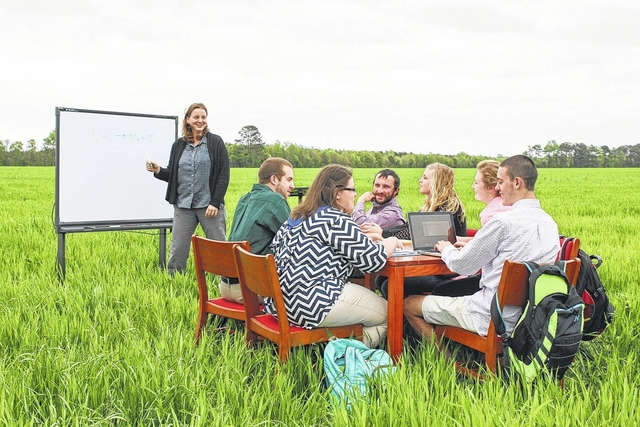
MOUNT OLIVE — For years, Mount Olive businessman and philanthropist George R. Kornegay supported the University of Mount Olive with his time, talents and resources. At the time of his death in November of 2014, he was actually working on a project to donate a 65 acre farm to the institution. It was one of his last acts of kindness. The farm is located about five miles from campus on Garner Chapel Road in Duplin County.
The Kornegay Student Farm will provide a multi-faceted resource to the University of Mount Olive. The farm will provide a platform for year-round crop production, various independent student projects, and field activities for selected courses. When fully operational, the farm will consist of both a traditional production unit and a certified organic production unit.
According to Dr. Sandy Maddox, director of the Lois G. Britt Agribusiness Center at UMO, the farm will be a tremendous learning tool for the institution. “The farm will provide the opportunity for our students to take the principles and theories learned in the classroom and apply them in the field,” she said. “We will be able to integrate all of our content courses and truly have a living laboratory for soils, crops, horticulture, IPM, and Ag mechanics.”
Maddox went on to note that the farm, which includes approximately 30 acres of cleared land and 30 acres of forested land, will provide an experiential learning environment for students interested in agriculture, forestry and environmental and natural resources. “Agribusiness students will be able to bring together marketing plans for the commodities produced at the farm,” she said. “We will also have animals on the farm which is not possible now without such a facility.”
Students will have the opportunity to participate in the Student Farm as volunteers, as interns for academic credit, as student employees, and as students in multiple classes. It is anticipated that throughout the year, the daily farming operations will be carried out by students with supervision and support from staff and faculty. Students will play a fundamentally important role in all aspects of the farm’s operation, including enterprise development and management, production, equipment maintenance, marketing, and financial planning.
Maddox notes that any income generated from the farm and any reinvestment of the income into the farm will serve as a practical, hands-on learning experience for students interested in evaluating sustainable agriculture practices and foods systems.
There will also be direct benefits to the University with anticipated enrollment increases in agriculture education, agriculture production systems and agribusiness programs. Enrollment increase in biology, botany and environmental and natural resource curricula are also anticipated as the Kornegay Student Farm will offer an environment for student independent study and research.
According to Maddox, the agriculture programs at the University of Mount Olive have experienced growth in student enrollment, educational program support, teaching facilities and increased faculty and staff.
“This growth has been accomplished as a result of the support of University administrators, University partners and supporters, and community and industry leaders,” Maddox said. “Traditional student enrollment in agriculture programs has grown to account for over 10% of the traditional UMO student population. The acquisition of the Kornegay Student Farm will only serve to enhance the opportunity for increased student enrollment in agriculture programs at UMO.”
Maddox also noted that the farm will serve as a link between the community and the University. “The potential for the farm to serve as a learning laboratory for youth, the community and as an incubator for aspiring agriculturists fortifies the importance and need for a facility of this kind in eastern NC,” she said. “The farm will serve to illustrate the University’s commitment to providing educational preparedness of UMO students, as well as demonstrate the University’s effort to continue to strengthen and grow the rural and agricultural communities in NC.”

